This year, I decided I was going to re-read (or read for the first time) all of Kurt Vonnegut's novels. With that in mind, I looked around for some books that get into the background of both the books and the author. This month I read three biographies of various types. I'll admit that by the end of the third, I was feeling a little like I was going over the same material, but each was different enough. Listed below are the books that I read all or part of this month.
THE MAN:
And So it Goes - Kurt Vonnegut: A Life by Charles J. Shields
The word that comes to mind is "workman-like". It's about as straightforward as a biography can be. Point to point without much editorializing or analysis in between. Still, this filled in a lot of details about Vonnegut's life that I was not familiar with (the kids, the wives, the agents, etc.) and gave me a pretty good framework for the other biographical books that I read.
Letters by Kurt Vonnegut (edited by Dan Wakefield)
Reading this directly after the Shields biography was about perfect. A lot of the details that were only mentioned in passing in this book I was already familiar with from my previous reading. I enjoyed Vonnegut's writing even in this non-narrative format.
Palm Sunday by Kurt Vonnegut
One of many "autobiographical collages" that Vonnegut published that collects some of his lectures and writings and attempts to connect them together. This is perhaps a little redundant with respect to the collection of letters above, but it was interesting to see how Vonnegut connects things as opposed to an editor or biographer. This added some depth to some life events, but as noted in the intro, I did start to feel like I was reading some of the same material.
THE NOVELS: (Analysis - I've only started these two, so any thoughts are preliminary)
The Vonnegut Effect by Jerome Klinkowitz
Klinkowitz has written a lot of analysis of Vonnegut's work. This book breaks things down by novel. Depending on how much I like this book, I might seek out some other Klinkowitz offerings (there are quite a few, here's his author's page on Goodreads, see if you can spot the theme).
Unstuck in Time: A Journey Through Kurt Vonnegut's Life and Novels by Gregory D. Sumner
Lest you think that I am some kind of truly original visionary with the re-reading Vonnegut idea, here's someone who already thought of it and wrote a book about it. This might be the book I'm most excited to read in this post. I've only gotten through the prologue (an abbreviated biography - Argh!) and the section on Player Piano so far.
So, fair citizens. What are you reading?

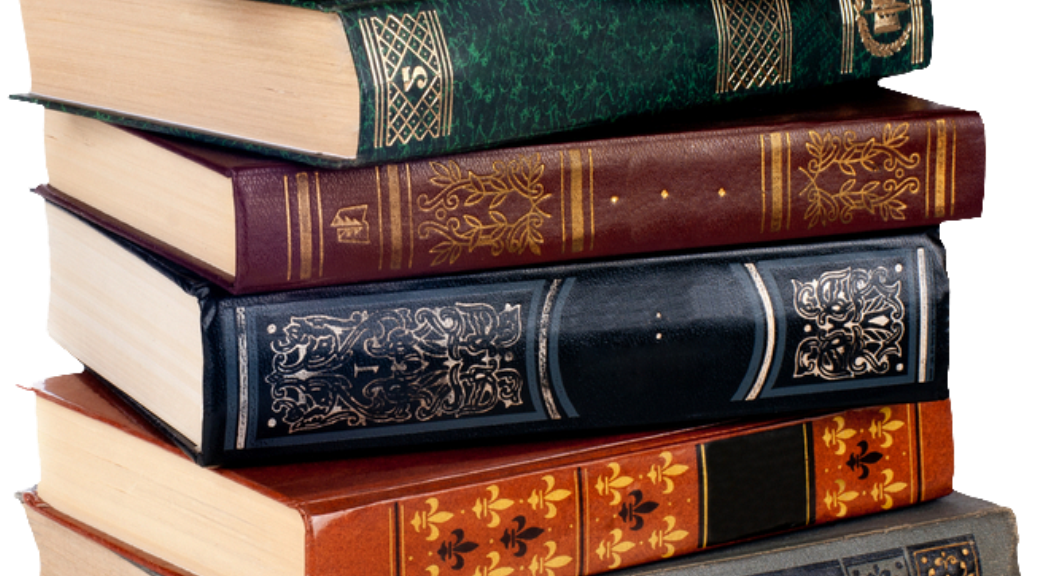
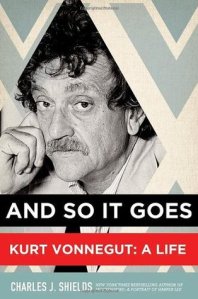
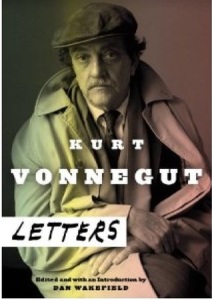
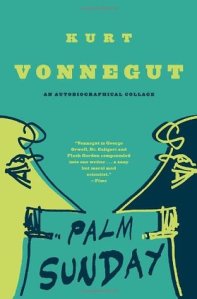
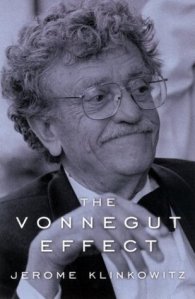
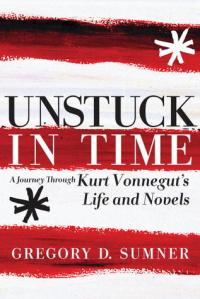
Neil Gaiman on Fifty Shades of Grey:
The commercial for the upcoming film during last evening's football contest (at about 8:35 pm CST) was the perfect time to send the kids to bed.
I saw a woman enter an elevator, and "Mr. Grey will see you now." or something, and clicked off on the remote.
I'd watched the trailer before because I was curious enough to find out what it (both the book and film) were like, with only 90 seconds of time spent.
I have read about 5 or 6 pages of The Goldfinch.
Reading actual books (rather than perusing field guides or reading online articles or short fiction that I've printed off) is a habit I'm well out of.
I'm half-way through book ten of my re-read of The Wheel of Time series. Looking forward to reading Cloud Atlas, which the Boy gave to me for Hanukkah.
I finished Richard Hugo's 31 Letters and 13 Dreams last week. An excellent book of poetry, but I think anyone not acquainted with Hugo would be best served by reading The Triggering Town first. I'm about 1/3 of the way through Li-Young Lee's Rose, which is blowing me away.
On Saturday I picked up a copy of Murakami's latest, Colorless Tsukuru Tazaki and His Years of Pilgrimage. Murakami is one of the few contemporary authors I will buy in hardcover, not wanting to wait until the paperbacks are out.
On the recommendation of a friend I'll probably be reading Ursula K. Le Guin's The Lathe of Heaven and John Crowley's Beasts soon-ish. I've actually never read Le Guin before.
Le Guin is awesome. I don't really remember Lathe, but I do remember both The Left Hand of Darkness and The Dispossessed being great.
I accidentally read The Left Hand of Darkness twice, but it was great both times.
I've read the Earthsea trilogy, and I think I'd read others but can't recall at this time.
Her other stuff tends to be much, much, much heavier. Both literally and literarily.
I know her other works (I have an anthology), it's just been a long time
I read a book this month. Wild by Cheryl Strayed, about a Minnesota woman who hikes the Pacific Crest Trail by herself with basically no training or much knowledge of the trail beforehand. She didn't stay at a Holiday Inn Express the night before, but she did shoot heroin within two days of starting the trip.
Has this been discussed here?
Pepper read it (and the movie got some discussion as well)
Okay. I concur that it is rather frank and honest. I couldn't really identify with her because as much as she talked about how great her mother is, I didn't really see her as all that great. (Go outside kids, mom's got a man over.) But, then again, this was her mother and her story. So, if that's how she felt about her mother, that's how she felt. Plus, her mother was a survivor in some pretty tough circumstances and that's not nothing. Plus, she did actually go to college, which was pretty cool, but I found it interesting how Strayed described how they went to college together. One year at St. Thomas and then they transferred to the U of M. Strayed in Minneapolis, and her mother in Duluth. So, yeah, they didn't go to college together, just at the same time, after that first year.
I kind of wanted to know a little bit more about what her life was like after the hike. Did she go back to Portland and hook up with her heroin addled boyfriend or was the trip really the end of that part of her life? I guess maybe the answer to that question may not put such a neat bow on her story.
Funny. She completely turned her life around after the book. Married a nice dude 4 years later. Has two kids. Successful writer even before she published Wild. One could argue there is one very neat bow put on her story.
Yeah I got that. My question was more specific. Did the trip mark the end or did she flounder around after that. This book was written fifteen years after the trip.
Sounds like somebody is lucky she didn't wind up like Christopher McCandless.
Oh d@mn, a "new" Alex Benedict novel came out! Looks like I've got some vacation reading for Ft. Myers the end of the month.
I've probably mentioned that I love Jack McDevitt's writing, particularly his Alex Benedict series and his Priscilla Hutchins series. The Benedict books. starting with A Talent for War, combines science fiction, Holmes/Watson style mystery, and treasure hunting into an entertaining mix.
I'm just about finished with the fifth Dark Tower book, Wolves of the Calla and I'm certainly intrigued with how this whole thing is going to wrap up. Also, these wolves sound a lot more effective than ours.
I hate to be the bearer of bad news, but you've already read the best of what the series has to offer. Better you hear it now.
I have heard that, but I still have to finish for completionists sake.
Harper Lee is releasing a sequel to TKAM that she wrote sixty years ago. Somebody here read it and tell me if it's good!
Interesting. One of my two go-to books for essay-writing in high school and college.
Any chance there's a sequel to the Autobiography of Malcolm X so the other can be followed-up?
I'm torn. I liked the stark aesthetics of her career arc and life: only written one book, and it was an established, canon classic for more than half her life, and I'll be disappointed in the alteration of that.
At the same time, good for her to finally find something else she was satisfied in having written.
Yes, please, someone read this and report on it.
#CapoteWriteIt
I hear it's going to be Hunger Games fan fiction.
Apparently the manuscript was thought to be lost:
This is a plot summary:
(Both quotes taken from this article.)
There appears to be some controversy over the announcement. Like her sister, who shielded Lee from publicity all this time, dying three months ago. When was the manuscript discovered? About three months ago.
huh
Yeahhh as exciting as the news is, there's something deeply queasy about it. Lee's mental health has allegedly been deteriorating to the point of senility and there are a lot of questions about whether the people controlling her estate actually have her best interests in mind. It would break my heart if this was just being pushed by her lawyers and agents as a cynical cash grab.
Harper Lee is releasing a sequel
Maybe someone can correct me on the semantics, but isn't TKAM the sequel, or rather, the prequel?
In terms of the events of the books, TKAM is the prequel and Go Set a Watchman is the sequel. But it seems that the sequel was written before the prequel. So . . . yeah.
she's a veritable George Lucas
Not a book, but I read Daphne DuMaurier's short story "The Birds" on the encouragment of EAR.
Today's snow-slowed commute gave me the time. (It will surprise no one that I printed it out in booklet form.)
I can see now why some of my interests give her the he-BGBs, even if the mechanics of what's described are really unbelievable.
Although I have no problem with Hitchcock's movie inspired by the story, I think a more faithful adaptation would also be quite good.
I liked DuMaurier (and Nat's) attention to the different species. Having Black-backed Gulls join the Herrings? And her descriptions of their regular character? Nice.
And cripes, a Gannet?
he-BGBs??? Why not heebie-jeebies?
Because I felt like being simultaneously cutesy and contrary.
because amr
Follow-up comment:
I then sent EAR a link to this, which creates a similar mood (but without the peril).
DG recc'd the collection a few years ago, and it took me about an hour to find it.
I was about to email for help, I finally found it by searching the WGOM for the word "Gnomon". (I first had to look at the wikipedia entry for Sundial.)
Until this LTE, that word was an hapax legomenon.
I managed very little reading in January, but my one book was definitely powerful: Citizen by Claudia Rankine. I'm not sure I can do it justice, but there's a very good description and review here. Rankine is an African American poet, and she explores questions about blackness in America through varied forms, not all of which are what I'd classify as poems. Photographs of contemporary art are interspersed as well.
It all sounds heavy and perhaps depressing, but the book is so slim, so well done, and so thoughtfully created that it's more than just something that you read and feel bad about. Rankine raises all kinds of interesting questions and I came away glad that I'd taken a chance on this book.
ALL THIS VONNEGUT AND I NEVER VENTURED OVER?!
Two books down in January
The Inconvenient Indian, an account of the history of the US & Canadian governments' interactions with the Native populations. The author, Thomas King, is himself one-half Cherokee, so the tone of the book is rather sarcastic and a bit fatalistic. I have a personal interest in the history of Native peoples as my great-grandmother was (at least according to family lore) a member of the Lenape tribe. I've always known that the government had treated the Indians poorly, but this book really revealed just how badly things have been, and the systematic ways of keeping them that way.
Lexicon I read the sample a while back and was intrigued, but it fell by the wayside. I finally got back around to it and read it inside 36 hours (granted 7 of those were in the waiting room whilst Lindsey got her tonsils out, then the rest where sitting on her couch making sure she didn't need anything in her narc'd up state). I loved the idea. One question that popped into my head while I read it was, "Could a specific set of signs work on deaf people?" It is a language, after all, just not one in the usual sense. Do the pathways through the brain that start in the ear work the same as the ones through the eye? I demand a sequel!
The book I'm currently working on is volume I in Caro's LBJ anthology. I gotta finish it this month to keep pace.
Ooh, Lexicon looks interesting. I'm adding that one to my shopping list.
I really liked it. It was a book that kept me in its world even when I wasn't reading it.
Please post on your LBG readings. I recently went to his library and found it very interesting.
POTUS libraries I have been to in the last several years:
LBJ (Austin) - Great photo of LBJ looming over some tiny Congressman
RR (Simi Valley) - Air Force One in the back room, American-Indianesque Oval Office styling
JFK (Boston) - Overcome by events
FDR (Hyde Park) - Polio, whatever
I'm only on page 30, but I'll report back as soon as I've finished.
Volume 1 is good, but 3 and 4 are spectacular.
Fwiw, the Award-Winning Roommate has finished his manuscript on Custer, and yesterday showed off the cover design on teh BF. the book should be out in a couple of months.
literally a cash grab?
After Inherent Vice last month, I tried to retain a little momentum and grabbed Monuments Men off the shelf. It read very quickly as it bounced from character to character along the Allies' advancing front lines. I always marveled while deployed at the OIF war machine, and have trouble imagining the scope of WWII's efforts and requirements. That the Nazis could have deliberately collected literally millions of pieces simply astounds me. Very enjoyable.
I also made it through Herman Melville's short story Bartelby. A lawyer employs a scrivener who politely "prefers" not to do an increasing number of tasks. And also prefers not to leave the office. What's a fellow to do? Move your business, naturally. I reflected on this one while trying to get the boy to pitch in a little around the house.
httpv://youtu.be/8BMsDJrjZHY
!! I feel somehow validated by this. Maybe I should be watching Archer.
Start?! You aren't already?
Yes.